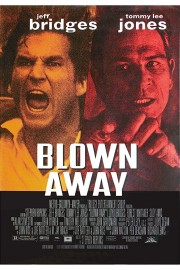Blown Away
As strange as it seems, Stephen Hopkins’ “Blown Away” was one of the first films I remember where a summer movie could be more about character than explosions. Of course there were others I’d seen by this point that did this (“In the Line of Fire,” “The Fugitive,” “Patriot Games”), but “Blown Away” worried less about adrenaline and more about telling an absorbing personal story within the framework of an action film.
Of course, with stars like Jeff Bridges and Tommy Lee Jones rather than Keanu Reeves (whose “Speed” had just come out), it’s not too surprising. The screenplay by John Rice and Joe Batteer (“Windtalkers”)- with an assist by, of all people, “Austin Powers'” Jay Roach- has all of the usual suspense thriller genre trappings, but Bridges and Jones’ professionalism carries the film through even the less-plausible moments (like how Bridges’ crew on the Boston bomb squad is unaware of his dark past).
Bridges stars as Jimmy Dove, an Irish-bred Bostonian whose audacity defusing bombs leads to some close calls, but also a keen awareness of how bombs work. Jones is Ryan Gaerity, a political prisoner in Ireland with a passion for bombs. As the film begins, we see him use his cellmate as cover to escape from prison. Now free, Ryan comes to America to enact revenge on Jimmy- whose real name is Liam. Like “Speed,” the battle becomes personal, with Jimmy and those around him targets- including his friend Max (Bridges’ real-life father Lloyd in a dramatic and enjoyable role) and new wife (Suzy Amis) and her daughter- for terror and destruction.
Stephen Hopkins isn’t an auteur but what you would call a “hired hand” director. No discernible finger prints, but a good storyteller with good material (as evidence by this and “The Ghost and the Darkness”; obvious when you see duds like “Lost in Space,” “The Reaping,” and “Predator 2”). Here, he lets Bridges and Jones do a lot of the heavy-lifting when it comes to the making us buy the story, along with vivid performances by the elder Bridges, Amis, and Forrest Whitaker as Jimmy’s cocky replacement when marriage makes him retire from the field. Meanwhile, Hopkins is as well adept at staging action and suspense with gusto and feeling as Alan Silvestri (in another noteworthy action score for the filmmaker after “Predator 2”) is in scoring it. Like all action flicks- there’s one too many climaxes, but that hasn’t made it any less interesting to watch over the years.
What made me add this to my “Movie a Week” series? It’s nothing terribly memorable, over-the-top, and it never really hit it big with audiences. For me, though, it’s always been a smart and exciting alternative to the more ridiculous action movies Hollywood puts out. That doesn’t make it better than them- just more interesting in a lot of ways than the “Speeds” and the “Mummy” films.










